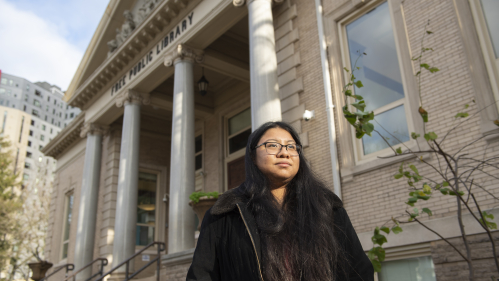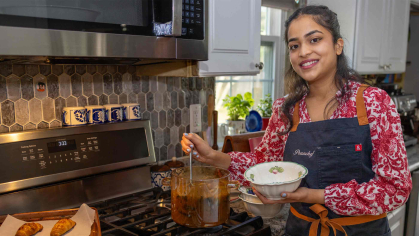Student Shares Commitment to Community Service in Podcast

Civic Voices audio project by Rutgers Bonner Leaders highlight work of New Brunswick organizations they serve
Rashel Bernal Reyes’ life straddles two New Brunswicks: The City of New Brunswick where she was raised and Rutgers-New Brunswick where she is a student.
“One of my friends dropped me off from class last year. The moment you turn from Rockoff Hall, past the cemetery, there are homeless people,” the sophomore said of an area near her Joyce Kilmer Avenue neighborhood that surprised her peer. “I told them, ‘You’ve finally entered our city. This is where we live. You don’t know because you stay in your area.’ ”
As a first-generation college student and daughter of Mexican immigrants, Reyes said she never considered higher education until community groups and mentors opened her eyes to the possibility in middle school. So when she arrived at Rutgers, Reyes looked for a way to give back to her community and better connect it with her campus.
She found her opportunity at Rutgers’ Collaborative Center for Community-Based Research and Service, which houses the Rutgers Bonner Leaders program. Part of the national Bonner Foundation, this network of college students at 70 colleges and universities is committed to community service and social justice. Through Bonner, Reyes discovered her niche in a familiar place, the New Brunswick Public Library, where until the pandemic hit, she taught conversational English to members of her community.
“I went to that library every day to do my homework because I didn’t grow up with a computer,” said Reyes, who is majoring in biology but is considering a switch to public health. “I’m really glad I get to speak with people I grew up with – a lot are Latinos from New Brunswick like my parents. I want to let them know there are people at Rutgers who want to help them.”
Reyes shares the story of her trajectory from New Brunswick resident to Rutgers student in Civic Voices: The Audio Diary Podcast Series. The student-centered audio project also features podcasts by five other Rutgers Bonner Leaders. Each profiles the New Brunswick community organizations where they serve, including Upward Bound, a pre-college program, and Youth Empowerment Services, which equips students with resources to help them succeed in higher education and beyond.
The series was the brainchild of Jim Jack, director of education and community artistic programming at George Street Playhouse, and was funded by the New Jersey Council for the Humanities through a partnership with George Street Playhouse and the Collaborative Center.
“I was curious about what happened if we relied upon the intuition, the perception, the passion and the curiosity of youth,” Jack said. “The primary concept was investing the power of story in the hands of these young community activists, community builders and seeing through their eyes. I was innately interested in what they would bring, and if we just carefully listened, what different stories might we hear.”
Jack approached Amy Michael, associate director of the Collaborative Center, and Claudio Mir, codirector of the Bonner Leader program, with the concept for the series in the summer of 2019 and began planning in fall 2019. During that time, Dustin Ballard, story producer on the project for George Street Playhouse, worked with students on the technical and editorial aspects of storytelling, including how to make recordings and conduct interviews.
In the midst of production, the pandemic began and safety measures were put in place to protect students and staff. Despite the challenges during this transition, Michael said the students decided to continue telling the stories of community.
“It was important for the students to have something positive to focus on and to feel like they’re still being productive,” Michael said. “We were not going to be stopped. We’re going to do something beautiful even though we are in the middle of the pandemic.”
Civic Voices went live in May. In her podcast, The Privilege of Going to College in My City, Reyes reflects on the challenges she overcame to get to Rutgers and those she still faces as a first-generation student, talking to the mentors who helped her find her voice, including Sean Hewitt with the Civic League of Greater New Brunswick.
“I feel indebted to them. I want to make sure you see the things I see. I wasn’t always like this,” said Reyes.
She also gives listeners a glimpse into the lives of her childhood friends, including Erika Jimenez, 18, who lives within walking distance of College Avenue, but has never seen a Rutgers bus, let alone the inside of a lecture hall. Jimenez, like many of Reyes’ peers, went straight to work after high school to help support her family.
Civic Voices captures the essence of what it means to be a Bonner Leader, said Michael, and reinforces Rutgers’ message to students about the importance of service. This fall she used the pieces as teaching tools during the Collaborative Center’s virtual new student orientation and remote mentoring classes with first-generation students.
“We tell students, ‘You are here for four years. You are part of the City. There should not be this Rutgers bubble,’” Michael said. “We think that by instilling that in students it changes them. No matter what community they are a part of when they leave here, they will feel a responsibility to contribute.”
The Collaborative Center and George Street Playhouse are applying for others grants to give a new crop of students the opportunity to produce podcasts. They intend to focus this series on equity and other questions in the community such as how digital misinformation campaigns can sow distrust and division in communities. They also plan to expand the project to include a Rutgers scholar who can contribute a written piece that contextualizes the podcasts in a broader perspective, and a visual artist who can work with the students to illustrate these stories.


